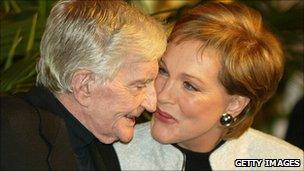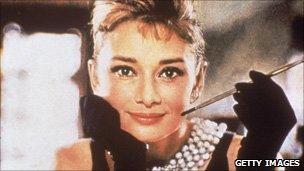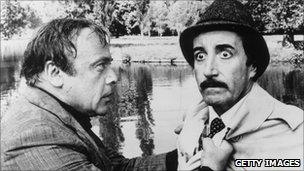Obituary: Blake Edwards
- Published

Edwards worked with his second wife, Dame Julie Andrews, on several motion pictures
From the chocolate-box sweetness of Breakfast at Tiffany's to the slapstick sleuthing of the Pink Panther films, Blake Edwards' light touch made him one of Hollywood's most successful directors.
The grandson of a silent filmmaker and son of a production manager, he spent much of his childhood watching Chaplin, Keaton and Laurel and Hardy in a local cinema.
"I went to school there, and my salvation was there," he said, insisting his enduring comic ability was never instinctive but always learned and practised.
With a friend he made Panhandle, a low-budget Western that gave Edwards his first and last starring role. But his writing was more successful.
He created comedy shows for Dick Powell on radio and Mickey Rooney on television and created two TV detective series, Peter Gunn and Mr Lucky, before settling behind the film camera.

Edwards gave Hepburn one of her most memorable roles in Breakfast at Tiffany's
He soon showed his cinematic range, directing submarine caper Operation Petticoat before charming audiences in 1961 with his adaptation of Truman Capote's Breakfast at Tiffany's.
The film gave Audrey Hepburn one of her most memorable roles, and its theme, Moon River, won an Oscar.
Days of Wine and Roses, made in 1962 with Jack Lemmon and Lee Remick, was a bleaker study of alcoholism but was also fairly successful.
The following year, Edwards created one of film comedy's classic characters by persuading Peter Sellers to play the accident-prone Inspector Clouseau in The Pink Panther.
Furthering the franchise
Edwards said working with Sellers was "truly a schizophrenic experience", but Clouseau - with his Mackintosh, moustache, ineptitude and visual gags - endured.
Henry Mancini's distinctive scores for the Panther films also began a long partnership with the director.

Working with Peter Sellers (r) was a "schizophrenic experience" for Edwards
Edwards' attempts to follow these slapstick triumphs met with mixed results, his commercial credibility only properly returning when he made a further series of Panthers in the 1970s.
Yet 10 - a 1979 study of the male menopause starring an on-form Dudley Moore and stunning newcomer Bo Derek - proved Edwards didn't need a large cerise feline to draw big audiences.
He persuaded his second wife, Julie Andrews, to ditch her Mary Poppins image and go topless in the 1981 satire S.O.B.
That and Victor/Victoria the following year were high points in a decidedly mixed career that would subsequently see him tread formulaic water with Blind Date and Skin Deep.
He also extended the Panther franchise long past its sell-by date, continuing it even after Sellers' death in 1980.
Belated Oscar
Despite his varied fortunes, Edwards enjoyed the respect of his Hollywood peers and continued to write into his eighties.
"The older and more desperate you get, the harder you should work," he explained.
He had two children from his first marriage and, with Andrews, adopted two further daughters from Vietnam.
His daughter Jennifer is an actress who has appeared in several of her father's films.
In 2004 Edwards received an honorary Oscar for his "extraordinary distinction in lifetime achievement".
Yet the director was philosophical about receiving the award. "I've had a hell of a life and can't do much better," he said. "So this is gravy."